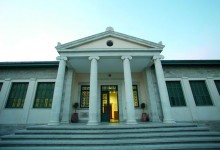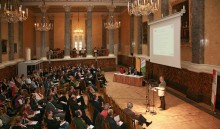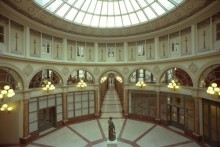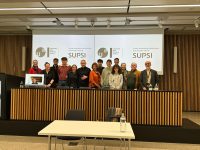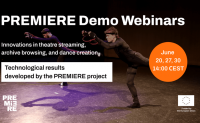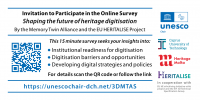CNRS MAP, together with FORTH-ICS is organising a Workshop on the Integration of Heritage Digital Resources. The aim of the workshop is to introduce the participants to the concept of linked data and to a selection of data curation tools that can be used for re-using and integrating data from across data silos (including examples from tangible and intangible heritage), including a demonstration of how to semantically map them. Emphasis will be laid on the transformation of existing resources (CSV, XML etc.) into RDF, through the use of data transformation mapping tools.
The workshop will last a half day and it will promote a hands-on knowledge of several important tools that are daily used by professionals in the field. Participants will finish the workshop with a greater familiarity with both the overall workflow and strategy for creating linked data but also a basic hands-on knowledge of a number of different software and data tools that would allow them to create and manipulate their own linked data by taking advantage of existing resources in the different communities
To find out more details, please visit our webpage http://www.
Date and place
The workshop will take place the 23/05 within the “Initial Training Network on Digital Cultural Heritage” Conference ( http://www.
Topics
The workshop focuses on the following topics and related subjects:
Data Cleaning with Open Refine
- Merging/splitting
- Clustering
- GREL
- Cell Crossing
Data Enrichment (Reconciliation & API)
- Wikidata
- Geonames
- VIAF & ORCID
- Getty AAT
- Europeana
Data Transformation Formal Ontology / CIDOC CRM
- Data Mapping Strategies
- Creating Schema to Schema Maps
- Creating URI Generator Policies
- RDFification
Format
The afternoon will begin with a brief overview of the overall workflow proposed for generating linked data and what benefits potential creators of this data should expect. The session will then break down into two distinct parts. The first segment will introduce data cleansing and preparation from heterogeneous sources, both methodologically and as regards the use of a particular tool. The second segment will introduce will introduce data mapping to an ontology to generate RDF encoded data: how to go about it both conceptually and with regards to a specific tool.
The first session will present to the participants the possibilities given by software such as OpenRefine to clean and enrich the data. Following a brief introduction where the participants will be presented with the core functionalities of the tool, the workshop is going to focus on the refinement and enrichment on a series of reusable examples, teaching the participants common formulas for aligning their data with their own schema or with external source typically used by the cultural heritage community.
The data mapping and RDF transformation session will be taught using CIDOC CRM as the target ontology and the 3M data mapping software, as the mapping and transformation tool. This session will introduce participants to the functionality of ontology for data integration/transformation and teach participants both conceptually how to begin the analysis task of mapping data to an ontology as well as how to actually implement this mapping in the 3M tool leading to data transforms into RDF.


